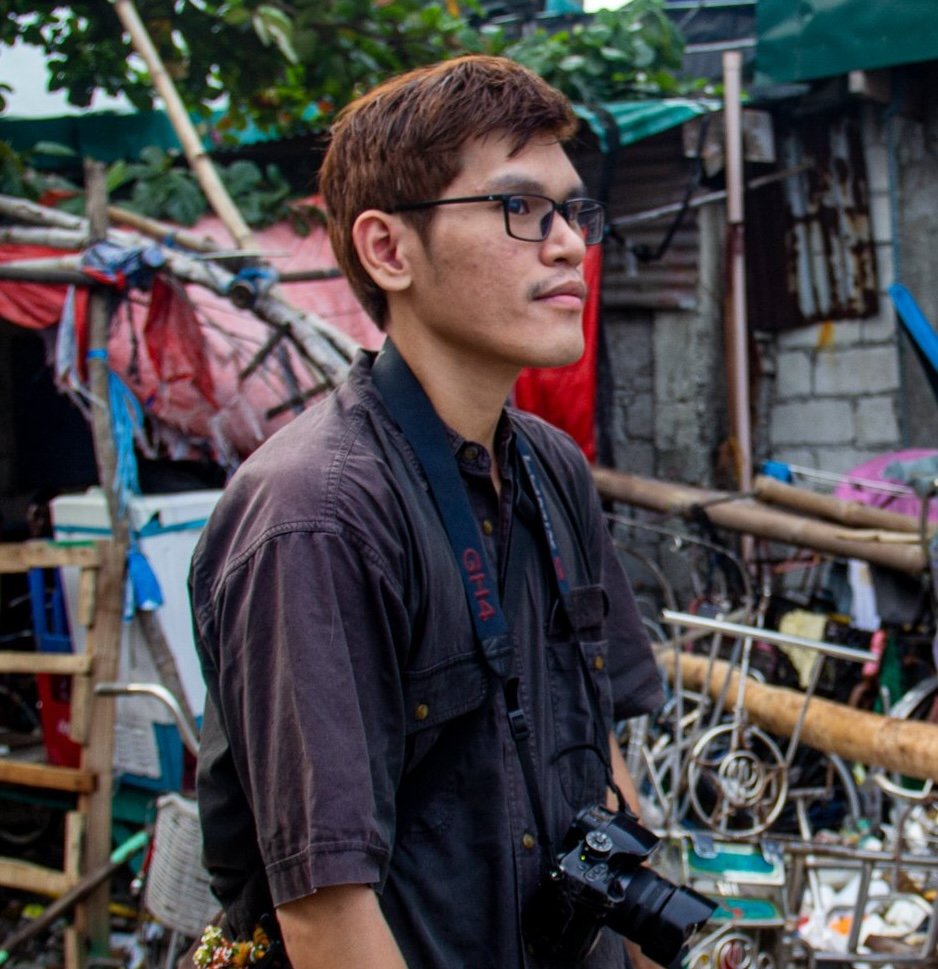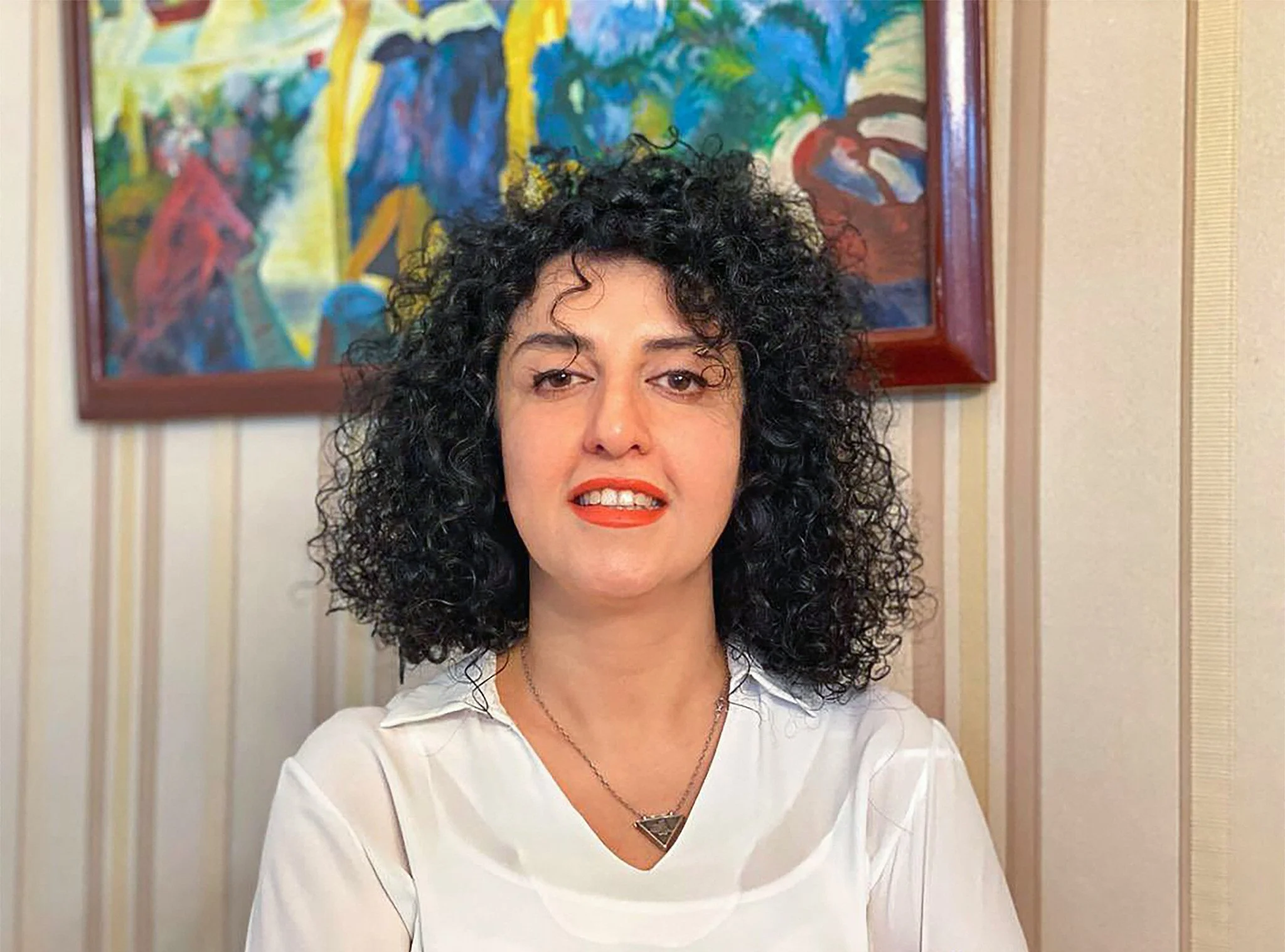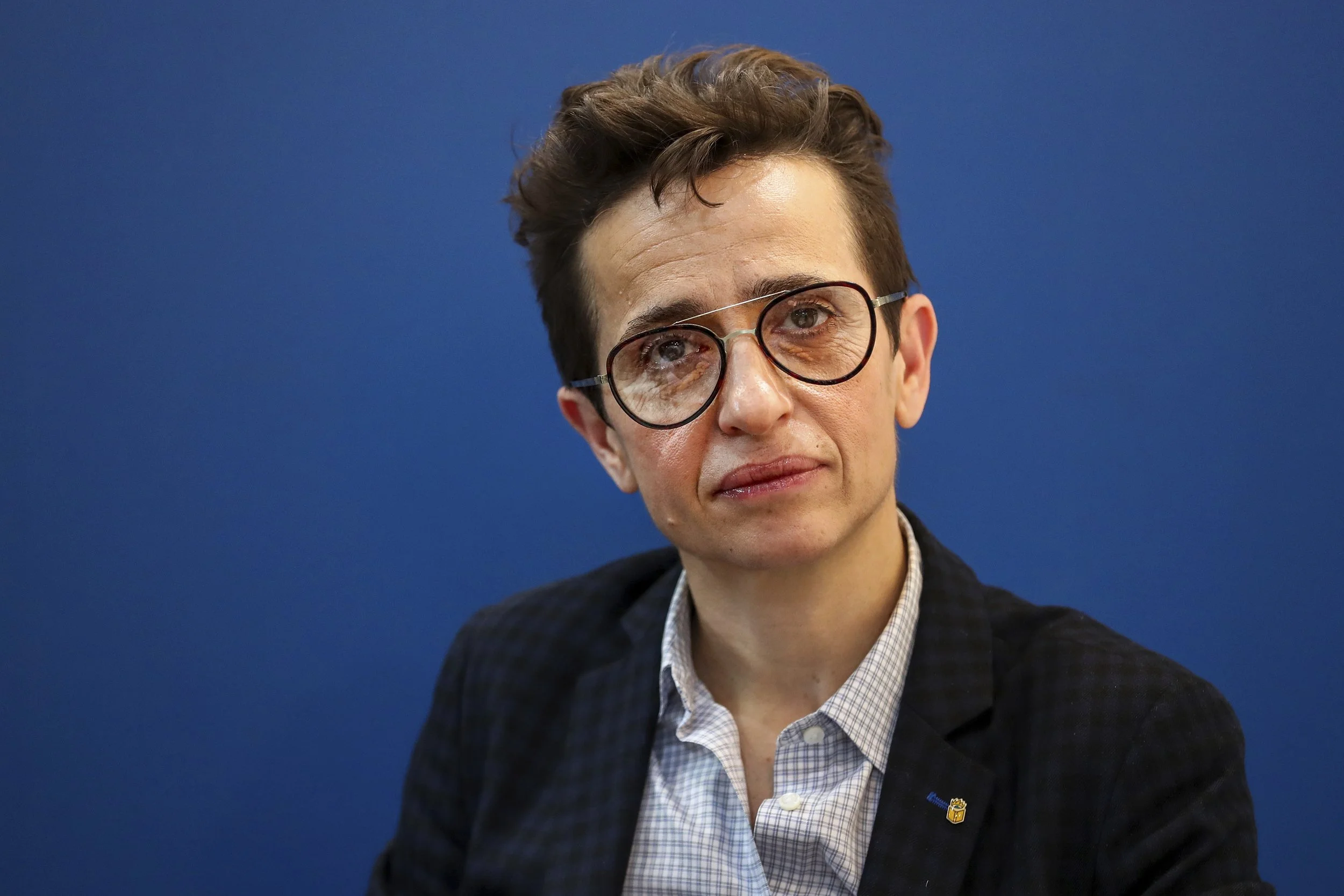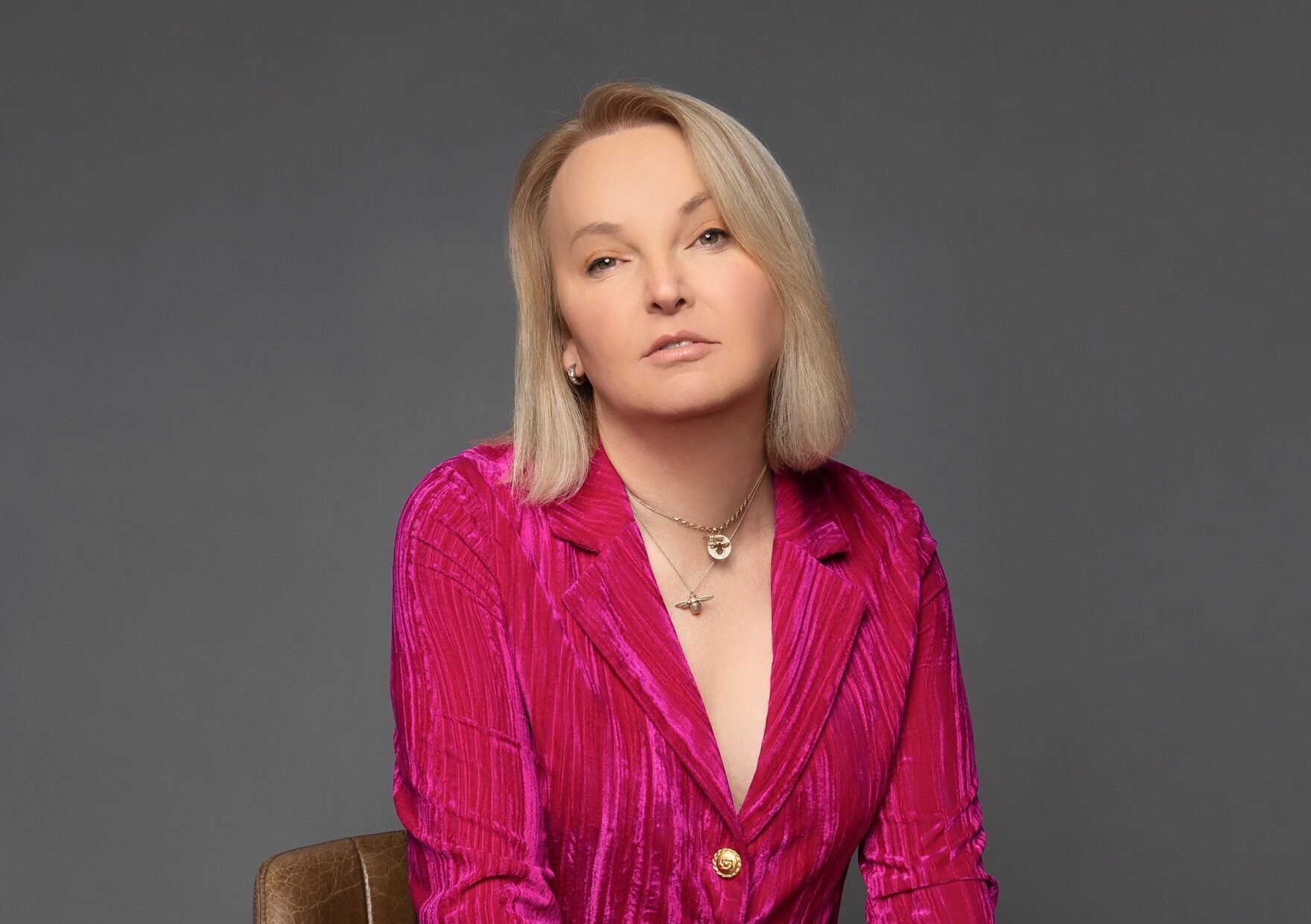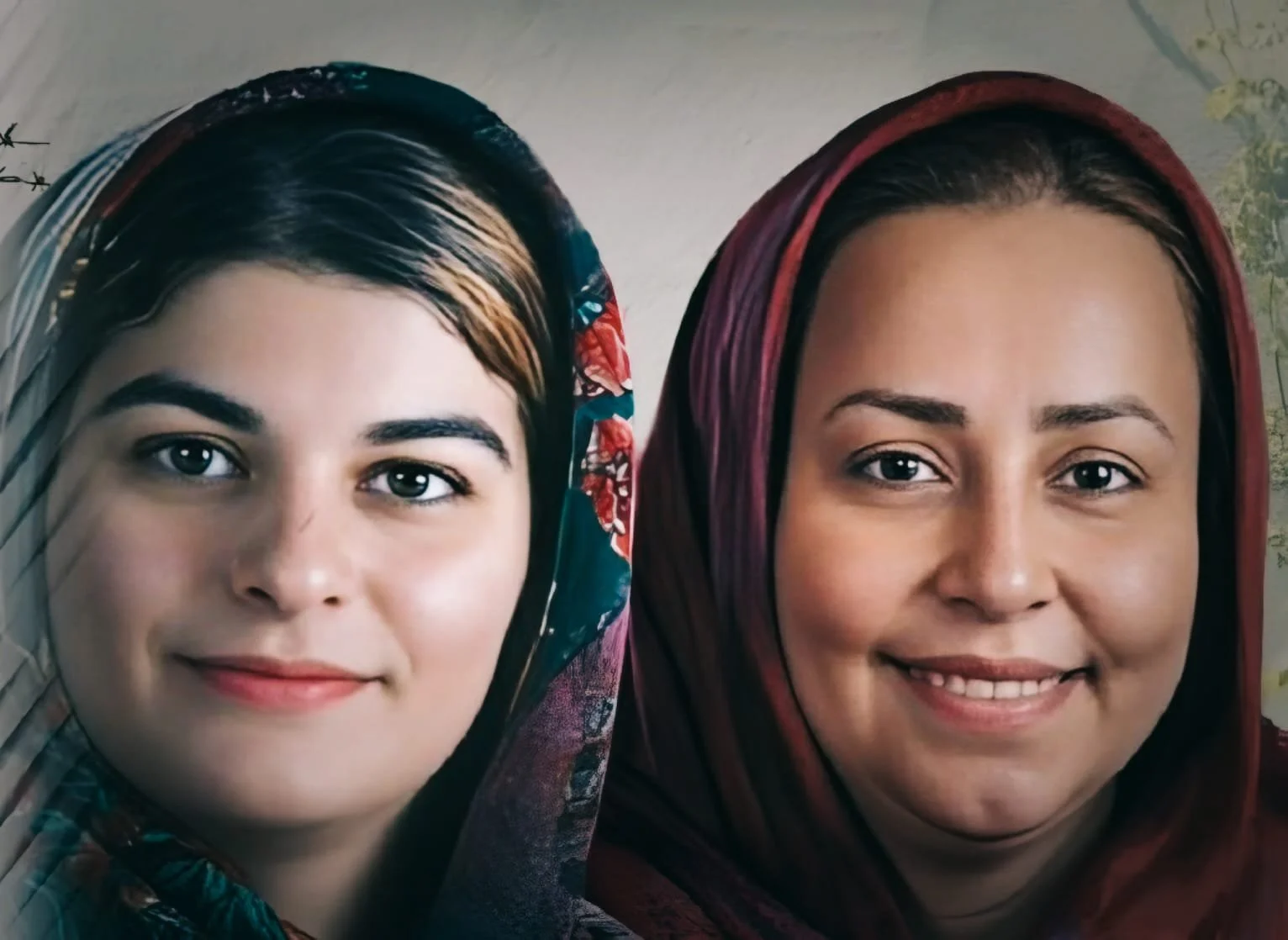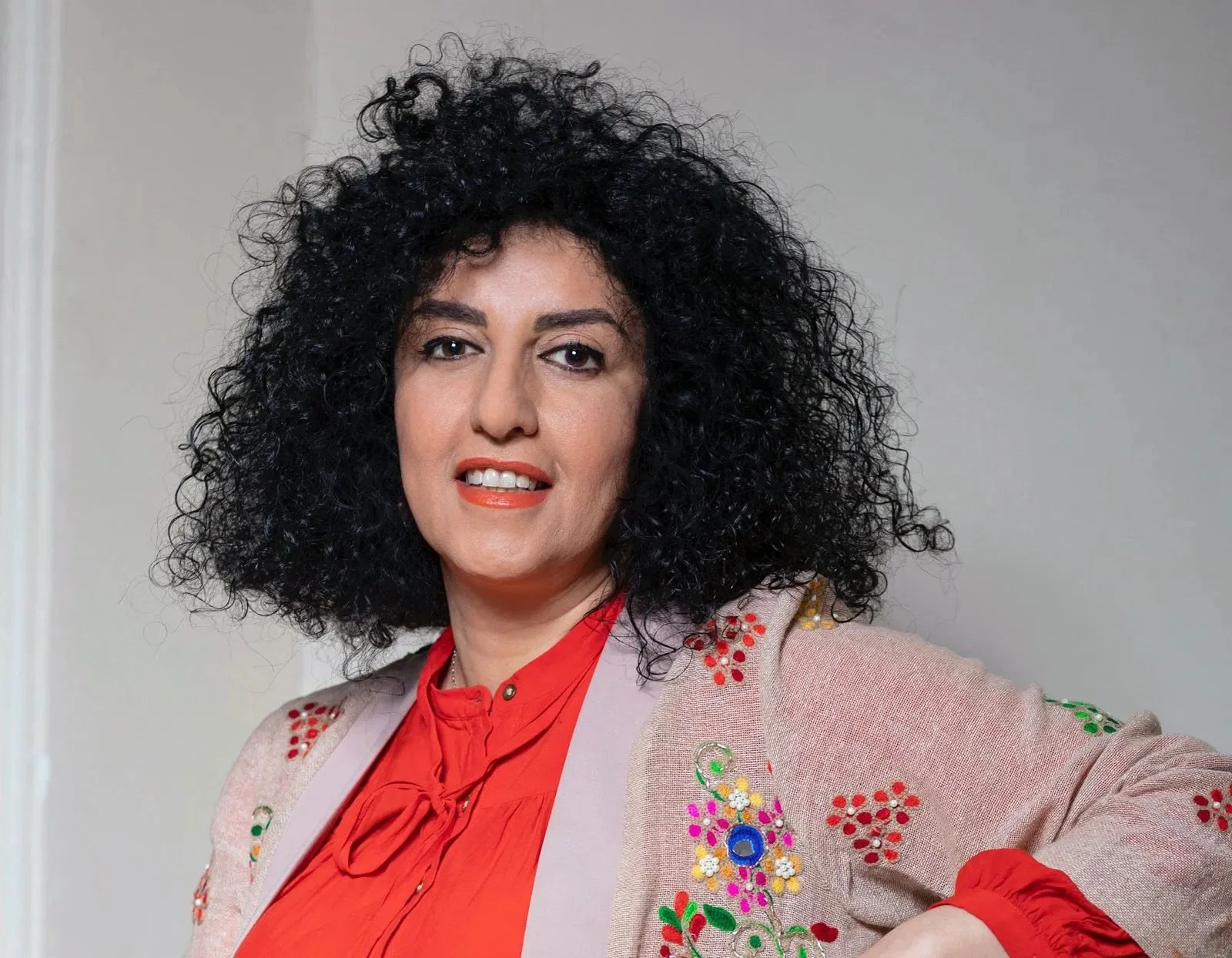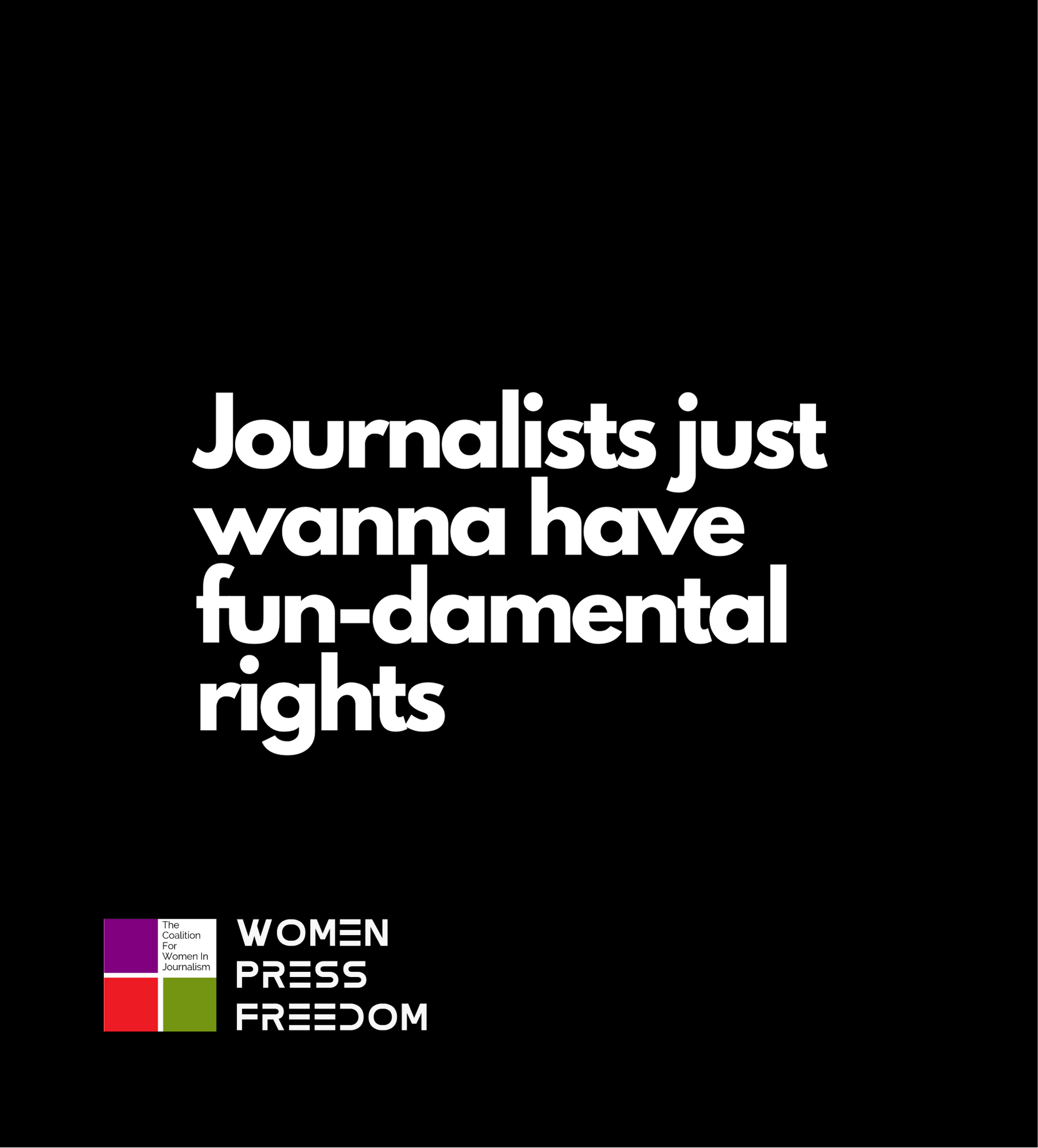Asal Abasian | Exiled Iranian Journalist, Writer, Queer Feminist Activist
This interview was originally published by PEN America.
Exiled journalist and writer Asal Abasian has taken such risks to write and live their truth. In Iran, independent writers and journalists take grave risks for merely reporting or reflecting on the reality around them, facing systemic censorship, jail time, or other forms of retaliation by the Iranian government.
A queer feminist activist and former Shargh journalist, Abasian, now based in Paris, was forced to leave Iran in 2021 under threat of arrest and imprisonment. “This move was driven by more than just these immediate dangers; living openly as a queer individual in Iran today is nearly impossible,” they said.
Abasian continues their work with international news outlets and has become a vocal advocate for the rights of writers and journalists at risk in Iran. Abasian spoke to PEN America about growing up in Iran enamored with print media, the impact of community in repressive environments, and their continued quest for freedom and justice. This interview has been edited for length and clarity.
What made you interested in pursuing journalism? How would you describe your experience working as a journalist in Iran?
Journalist, writer, and activist Asal Abasian. Photo credit: Berk Ucak, Istanbul, Winter 2023.
I had the privilege of being part of a generation that lived in the golden era of print media. When I was 15-years-old—17 years ago—the internet had not yet become widespread, and I was still immersed in the world of paper and ink. During those years, a magazine in Iran, known for its slogan of being the “voice of the new generation,’’ captured the hearts of teenagers across the country, and I was among its devoted readers and fans: the weekly magazine Chelcheragh.
This publication, now two decades since its inception, was incredibly influential and avant-garde during that time. With each issue, I found myself discovering new aspects of my identity, unearthing my interests, and gaining insights into the world. I eagerly awaited its arrival at the newsstands and each week I would carefully compose a letter that my mother would take to the post office to send it to the magazine’s office. The journalist responsible for responding to these letters would read mine and reply with a few brief sentences, which I would excitedly find printed in the following issue. For me, this was a thrilling experience, as if I had broken free from the small, isolated world I often felt trapped in. As a writer, nothing compares to the tactile experience of putting pen to paper. Through those weekly letters, I felt as though I was stepping into a broader world.
In my final year of high school, I became a volunteer reporter for Chelcheragh, and after graduating, I joined the magazine’s editorial team as an intern. At the same time, I began studying English language and literature at university, where I delved into the works of literary giants like Virginia Woolf, William Faulkner, and Milan Kundera, exploring the beauty of literature through their words.
This is how my journey into writing and journalism began—filled with excitement and passion.A year later, I achieved what felt like an unattainable dream by joining the editorial team of Shargh newspaper, one of Iran’s most prominent media outlets. For me, still not yet twenty, it was a significant milestone. I spent nearly a decade at Shargh, covering a wide range of political, social and cultural topics. Through this work, I not only grew as a writer but also gained a deeper understanding of the world. To me, the gift of writing and reporting is the ability to observe life directly and narrate it with clarity and truth. It’s a gift I hold incredibly dear—perhaps the only thing of true value in the world, especially when writing becomes a tool in the struggle for liberty. As my fellow writer and activist Sepideh Rashnu aptly puts it: “The only thing more beautiful than freedom itself is standing up for it.”
“To me, the gift of writing and reporting is the ability to observe life directly and narrate it with clarity and truth. It’s a gift I hold incredibly dear—perhaps the only thing of true value in the world, especially when writing becomes a tool in the struggle for liberty.”
Were you able to engage with queer literature, art, and media while living in Iran? How has the ability or inability to engage with queer voices and communities impacted you?
In Iran, the harsh reality of severe censorship and relentless repression makes it nearly impossible to openly discuss LGBTQI+ issues. The environment is so oppressive that even the most basic conversations about queer identities and experiences are fraught with danger. For a time, a small group of us from the queer community managed to create a safe haven of sorts, meeting clandestinely once a week to read and discuss key texts related to queer theory and feminism. These gatherings were more than just discussions; they were an act of resistance, a way for us to assert our identities and strive for a more conscious existence as queer feminists within a society that consistently seeks to erase us.
However, our already fragile space was further destabilized by the outbreak of COVID-19, which forced us into greater isolation. The pandemic, combined with the ever-present threat from the Islamic Republic’s security forces, ultimately led to the dissolution of our group. The risk of arrest, harassment, or worse became too great, and what little community we had was scattered.
Yet, despite these challenges, a new avenue for connection and expression has emerged.
Social media has become a vital platform for the Iranian LGBTQI+ community, offering a space where our voices can be heard and our stories shared. This digital landscape, though not without its own risks, has allowed us to connect with one another and with the global LGBTQI+ community in ways that were unimaginable just a few years ago. The solidarity and support we receive from our international peers are invaluable, providing both comfort and strength in our ongoing struggle.
Looking back to 2016 or 2017, the idea of openly sharing our narratives or building a global network of solidarity seemed like a distant dream, if not an outright impossibility. Today, however, it is a reality, and while the road ahead remains fraught with challenges, the ability to engage with the world beyond our borders has become a powerful tool in our fight for visibility and rights.
What does queer visibility mean to you? How do writers, journalists, and activists in Iran facing repression for both their speech and their queer identities grapple with speaking openly about their experiences?
Queer visibility, to me, represents the courage and freedom for us, as members of the LGBTQI+ community, to express our identities openly and authentically, free from the paralyzing fear of homophobia, transphobia, and the severe security risks that often come with being who we are. It’s about more than just self-expression; it’s about creating a path for others in the community to find their voices, ensuring they feel safe to do so, and fostering an environment where everyone can live their truth without fear of persecution or violence.
However, in today’s Iran, the reality is starkly different. The oppressive forces of censorship and state-sanctioned repression make it nearly impossible for queer writers and journalists to share their stories and experiences openly. The stakes are unimaginably high, with consequences ranging from imprisonment to death. Telling one’s truth—narrating the lived experiences of being queer in such an environment—is an act of profound bravery, carrying unimaginable risks.
Our dream is to see a future where the Iranian government ceases its violations of LGBTQI+ rights and where society as a whole—families, schools, universities, and workplaces—transforms into spaces of acceptance and support for the LGBTQI+ community.
“Telling one’s truth—narrating the lived experiences of being queer in such an environment—is an act of profound bravery, carrying unimaginable risks”
We yearn for a time when queer people can live and thrive openly in every aspect of life without fear, prejudice, or discrimination. While this dream may seem distant in today’s Iran, the hope for such a future continues to fuel our fight for visibility, equality, and justice. My mission, as a queer person who does not consider themselves bound to any specific geography, is to fight for a just world where diverse identities are respected and where language, race, and orientations are no longer reasons for exclusion or ostracism.
How does censorship in Iran impact the ways in which writers, including queer writers, can express themselves?
Censorship in Iran effectively strips individuals of their fundamental right to share their stories and experiences. The oppressive censorship regime renders it nearly impossible for writers and journalists to freely express themselves within the country. For those seeking to publish their work, the only alternative is to turn to Persian-language publishers based in exile. However, even this route comes with significant challenges, as works published abroad may not reach or impact audiences within Iran due to the strict control over information.
This pervasive censorship does not only target members of the LGBTQI+ community but extends to all writers and activists who advocate for freedom and human rights. The regime’s stringent control over media and publications suppresses dissenting voices and stifles critical discourse across all sectors of society. For any writer or journalist fighting for change, the risk of facing severe repercussions—ranging from imprisonment to other forms of persecution—makes the act of sharing their truth an act of extraordinary courage.
The impact of this censorship is profound, as it limits not only the range of voices that can be heard but also the diversity of perspectives that can be shared. It reinforces a culture of silence and fear, where individuals and communities are left without a platform to advocate for their rights or highlight their struggles.
Can you talk about what led to your decision to leave Iran?
Asal Abasian shows their tattoo, which reads “Women, Life, Freedom” in Persian. Photo credit: Berk Ucak, Istanbul, Winter 2023
In Iran, I faced serious threats of arrest and imprisonment due to my activism and work, which forced me to leave Iran abruptly for Türkiye in October 2021. This move was driven by more than just these immediate dangers; living openly as a queer individual in Iran today is nearly impossible. The hostility from both the government and society makes it a perilous environment for anyone expressing their true identity.
As I prepared to leave, I was overwhelmed with fear and uncertainty about how I would cope. Departing from my homeland felt like an emotional upheaval, leaving me grappling with profound doubts and a deep sense of loss. I spent days feeling vulnerable, struggling to come to terms with the painful reality that my homeland had rejected me.
In Türkiye, I found the opportunity to come out as a queer, marking the beginning of a transformative chapter in both my professional and activist life as a feminist. Stepping out of the closet allowed me to embrace and present my true self without fear. This newfound freedom was a significant shift from the constraints I faced in Iran.
Fortunately, my family, who had been aware of my queer identity from the beginning, provided me with immense support during this period of coming out. Their acceptance was a critical source of strength as I navigated these challenges. However, I faced significant rejection from former colleagues, friends, and acquaintances back in Iran, which was incredibly painful. Despite the emotional toll of such rejections, I remained driven by larger ideals that gave me the resilience to endure the difficulties and continue my activism with unwavering determination and courage.
Since January 2023, when I relocated to France after receiving the Marianne Initiative Award, my journey has been both challenging and transformative. Despite the numerous hurdles I faced, including adapting to a new country and navigating its complexities, the award opened doors to new opportunities, allowing me to advocate for social justice and equality with a relentless spirit. The challenges I have overcome have only strengthened my resolve, and I am more determined than ever to make a positive impact in the fight for a fairer and more inclusive world. I identify as a global citizen with a duty to serve humanity through storytelling and the struggle for a just world; where geographical, political, and class boundaries do not serve as instruments of separation, humiliation, or exclusion, and human dignity is the fundamental principle and foundation. I do not consider myself belonging to any particular land. In my journey, and in the words of my beloved writer Julia Kristeva, I traverse myself.
Asal Abasian shows their tattoo, which reads “Women, Life, Freedom” in Persian. Photo credit: Berk Ucak, Istanbul, Winter 2023
You’ve spoken with members of the international community at the United Nations where you’ve advocated for writers and other people facing political persecution in Iran. Why do you believe it is important to advocate for writers? For people outside of the country, what kind of advocacy is most impactful to support free expression in Iran?
I must begin by expressing my deep gratitude for the invaluable experience I had advocating at the United Nations headquarters in Geneva. This opportunity, generously supported by PEN America, was truly unique and profoundly impactful. I am sincerely thankful for the chance to engage in such meaningful work.
Supporting Iranian writers and journalists who grapple daily with severe censorship and repression is not just a privilege but a fundamental responsibility for anyone dedicated to the cause of freedom. The true battleground for this struggle is within Iran itself. The courageous individuals like Sepideh Rashnu, Sarvenaz Ahmadi, Anisha Asadollahi, Narges Mohammadi, and others who endure the harsh realities of imprisonment embody the heart of this struggle.
In the historic movement of Iranian women, which has been fervently pursued for nearly a century, “Woman, Life, Freedom” and the defiant cries of Iranian women and the queer community against compulsory hijab and systemic inequalities marked a turning point in history. As it was written on Mahsa Jina Amini’s grave on the day of her burial: “Jina, your name will become a symbol.” Indeed, her name became a symbol and is now immortalized in the history of the global women’s movement.
Although this was not the origin of the global movement of “Jin, Jiyan, Azadi” (Woman, Life, Freedom), which began in Kurdistan and Rojava, it transformed it into an eternal, worldwide struggle that sparked a wave of solidarity between women across the globe and the courageous women of the Middle East. Even after two years, the brave women of Iran continue their daily fight against compulsory hijab, and it is truly awe-inspiring. They fear neither arrest, death, nor intimidation. They embody the true essence of resistance—they are unparalleled.
For those of us outside Iran, it is our crucial role to amplify their voices and advocate for their cause. We must be the conduit through which their stories and pleas for freedom are heard globally. It is our responsibility to ensure that the struggles and sacrifices of these freedom fighters within Iran are not in vain and that their fight resonates with defenders of liberty around the world.
While fleeing a country can offer immediate safety, we know that many people living in exile face ongoing or new challenges. Can you talk about your experience adjusting to your life in exile and finding community in new places?
Adjusting to life in a new society with stark cultural, social, economic, and political differences from my first homeland involves numerous daily challenges for any newcomer. The process of integrating into a new society and finding one’s voice in an unfamiliar language are significant hurdles that complicate this transition. Despite these obstacles, my focus remains on the deeper meaning and significance of these challenges, rather than the hardships of living in exile and being separated from loved ones.
Each moment serves as a reminder of the profound importance of this journey: living in the pursuit of freedom. What could be more valuable than this quest? It is a privilege that enables me to confront and overcome the various hardships and feelings of alienation that come with this new chapter of life.
In France, I have found a supportive environment that has enabled me to deepen my commitment to justice and equality. This period of transition has not been without its difficulties, but it has also been a time of remarkable development and achievement. I have been able to channel my experiences and insights into meaningful action, driving forward my activism with a heightened sense of purpose and resilience.
“It is our responsibility to ensure that the struggles and sacrifices of these freedom fighters within Iran are not in vain and that their fight resonates with defenders of liberty around the world”
I believe that the isolation, alienation, and distance from my first homeland, combined with the various forms of discrimination and hardship I’ve faced, provide me with the essential raw material for crafting my narrative. These experiences, though challenging, are central to my narrative voice. They shape my perspective and imbue my work with authenticity and depth. In many ways, they transform my struggles into a source of strength and resilience, making the adversity I encounter more bearable. This process of converting hardship into narrative fuel is what motivates me to persevere, to share my journey, and to seek meaning amidst adversity.
In a recent interview, you described queer identity as signifying a struggle. Whether it’s a person, a book, a physical space, or something else, where do you find support in this struggle to keep going?
I must confess that the history of queer activism, illuminated by the pioneering efforts of figures such as Audre Lorde, Barbara Gittings, and Edith Windsor profoundly strengthens my commitment to this ongoing struggle and fills me with immense pride. Their groundbreaking work not only inspires me but also highlights the enduring power of resilience and advocacy.
Beyond these historical influences, engaging with the writings of contemporary intellectuals like Susan Sontag, Michel Foucault, Sara Ahmed, bell hooks, Judith Butler, Silvia Federici, and many others has been instrumental in deepening my understanding of my role as a queer feminist narrator. Their profound insights into identity, power, and resistance provide invaluable perspectives that enhance my grasp of the complexities and nuances of queer life today.
These intellectual influences do more than inform my activism; they also serve as a crucial source of motivation as I face the daily challenges of this relentless fight. They transform my struggles into opportunities for growth, helping me to find meaning and purpose in my unwavering quest for justice and equality. This synthesis of historical and contemporary thought continually renews my resolve, ensuring that my efforts remain steadfast and my commitment resolute.
Asal Abasian is a queer feminist activist, journalist, and writer from Iran. Abasian fled Iran in October 2021 due to threats from the Islamic Revolutionary Guard Corps related to their journalism and activism. They lived in Türkiye for 15 months and relocated to France after receiving the Marianne Initiative Award in 2023. Abasian is a member of French PEN Club and has consulted with PEN America’s Writers at Risk Program. They are also a participant of the Voices in Exile fellowship run by CFI, Reporters Without Borders (RSF), SINGA, and Maison des Journalistes (MDJ). Most recently, they contributed to Des Iraniennes: Femme, Vie, Liberté (Éditions des femmes, 2024), which documents the fight for women’s equality in Iran over the past 45 years. Abasian graduated with a degree in English Literature and has worked for publications in Iran including Shargh Daily, Chelcheragh and Andishe-pouya. They have also worked as a freelance journalist for BBC Persian, Radio Zamaneh, Evrensel, and Kaos GL. They are on X @asal_abasian and Instagram @asal.abasian.
Women Press Freedom is an initiative by The Coalition For Women In Journalism
The Coalition For Women In Journalism is a global organization of support for women journalists. The CFWIJ pioneered mentorship for mid-career women journalists across several countries around the world and is the first organization to focus on the status of free press for women journalists. We thoroughly document cases of any form of abuse against women in any part of the globe. Our system of individuals and organizations brings together the experience and mentorship necessary to help female career journalists navigate the industry. Our goal is to help develop a strong mechanism where women journalists can work safely and thrive.
If you have been harassed or abused in any way, and please report the incident by using the following form.





